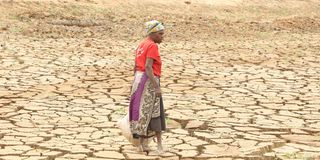Two key Taita Taveta dams dry up, threatening wellbeing of humans, wildlife

A woman at the Kishenyi dam in Wundanyi, Taita Taveta County. Taita Taveta is reeling from the effects of changing weather patterns that have led to the drying up of two major dams that humans and livestock depend on.
As world leaders gather in Egypt for the United Nations Climate Change Conference (COP27), Taita Taveta is reeling from the effects of changing weather patterns that have led to the drying up of two major dams that humans and livestock depend on.
Climate change has caused considerable impacts on the Kishenyi and Mwatate dams that collectively supplied water to over 10,000 residents.
The dams, which supplied water for domestic, livestock and irrigation use, have completely died up, leaving only pools of stagnant water dotting their parched beds.
An acute water shortage has gripped many parts of the county in recent months, a crisis attributed to a prolonged dry spell.
Encroachment on water catchment areas and the destruction of indigenous forests have also been blamed for aggravating the situation.
Kishenyi, which used to be the county's largest dam, providing drinking water to more than 6,000 people in Werugha and its environs, was also the most vital source of water for horticultural agriculture in the neighbouring community.
Since its construction in 1959, the dam had served locals for farming, livestock and fishing, said resident Mwakisha Mserekwa.
The current water shortage also affects downstream populations, including in Kishushe and Wumingu.
"This was once an unending water resource that served us for both domestic and irrigation purposes. There used to be enough water to make all this area green with crops. I cannot believe it is completely dry," he said.
Water levels in the dam had gone down in the last decade, he said.
Mr Mserekwa said he has abandoned farming due to a lack of irrigation water and rainfall.
Due to uncontrolled farming around the dam and upstream in the catchment areas and the lack of sufficient rainfall to replenish its waters, the dam became desiccated and dried up.
"Years ago, the dam was a lifesaver to residents. Now, all the trees and crops around have died,” he said.
The Mwatate dam, on which over 4,000 people in Singila, Majengo and Peleleza depended, has also dried up, putting at risk thousands of families that rely on it for domestic and livestock use.
The water shortages also affect industries.
About 25 per cent of operations at the Teita Sisal Estate in Mwatate have been halted due to lack of water, said manager Antony Darrah.
"If this continues, then we might be forced to lay off some of our staff. That means that these people will lose their livelihoods," he said.
The drying up of the dam is a stark illustration of the effects of climate change, with a lingering drought affecting the bread baskets of the area, said County Commissioner Loyford Kibaara.
The government, he said, must now deliver water on trucks to residents in areas where it was plenty some years ago.
Speaking in Wumingu, he said water sources in the Taita Hills had dried up and residents now depend on water bowsers for their supplies.
"It is a sad situation that even in these areas the government has to provide water bowsers to supply water," he said.
Governor Andrew Mwadime said the government is mobilising resources to dredge out silt from the two dams and stop human activities that have choked the sources.
He said the Water Sector Trust Fund has set aside Sh80 million to rehabilitate the dams.
"These funds are not enough, but we are still mobilising resources to dredge the silt. We will also plant trees in the catchment areas," he said.
Climate change is one of the factors that has led to the drought now affecting most parts of Kenya, and Taita Taveta Water executive Granton Mwandawiro accused residents around the Kishenyi dam of exacerbating the situation.
He blamed human activities around the dam and the catchment areas.
"There is a need to control farming around the dam. Today, farmers are farming right at the centre of the dam so we need to control the encroachment," Mr Mwandawiro said.
He urged stakeholders to help desilt the dam.
"Desilting is very expensive and as a county, we don't have enough resources for [it]," he said.





